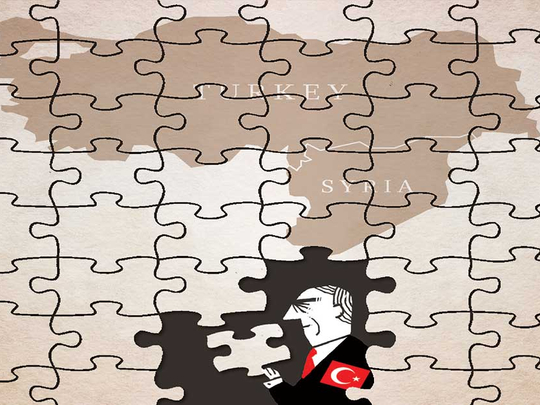
For the past five years, since the beginning of the Syrian crisis, Turkey has been trying to dictate the course of events in the conflict — at least in the north of the country. The grand strategic objective was to allow the sort of change that would serve its own interests, rather than resisting it and hence risk losing everything — as it did in Libya, when economic interests led it at the beginning to oppose the rebellion against Muammar Gaddafi. It was only after the military balance of power tipped against Gaddafi that Turkey was prepared to change tack in a country where it had investments worth $15 billion (Dh55.17 billion). To avoid a similar outcome, Turkey moved relatively quickly to support the Syrian opposition in 2011.
A mixture of political, economic and geopolitical motives drove Turkey to seek regime change in Syria. By becoming host to the major armed opposition groups, Turkey tried to secure a key role in Syria post-Bashar Al Assad. It also needed to establish a friendly regime in Damascus so that it could guarantee safe passage for its booming trade relationship with the Gulf and the rest of the Arab world. The most important factor driving Turkish involvement in the Syrian conflict, however, was geopolitical: The need to contain Iranian influence. Since the US withdrawal from Iraq, Iran had created an arch of influence that stretched from Afghanistan to the Mediterranean, and from Armenia to Syria, and thus squeezing Turkey. The Syrian revolution has hence provided Turkey with an opportunity to adjust the balance of power in its favour, replacing the pro-Iran regime on its doorstep with one which would become its own strategic partner.
Turkey thought that bringing the Syrian regime down was a straightforward, relatively easy business. Sharing more than 900km of border with Syria was seen as an advantage in this regard. Iran, it was thought, might resist a bit, but would eventually give up on Syria if it was allowed to keep Iraq. Russia did not seem genuinely interested in defending Al Assad beyond providing a political and diplomatic shield in the United Nations Security Council. That proved to be a bizarre miscalculation and severe lack of judgement on the part of Turkish foreign policymakers.
Under Russian administration, the Syrian regime, supported by Iranian-backed militias, was not only allowed to make substantial gains against the Turkish-backed armed opposition groups, but Russia has also allowed the consolidation of autonomous Kurdish-held areas on both sides of the Euphrates in the north of Syria; and hence increasing the prospects of a self-declared Kurdish state on Turkey’s doorstep.
With the lack of a United States or Nato cover, Turkey’s options in dealing with these challenges are becoming increasingly limited, especially as Russia becomes the primary power-broker in Syria. Turkey’s almost total dependence on Russian and Iranian energy supplies further constrains its options. Having to steer carefully through this complicated environment, Turkey’s maximal aim became the formation of a 98km long safety corridor along the border with Syria to accommodate the influx of Syrian refugees and prevent the Kurds from joining the border strips they control to the east and west of the Euphrates.
Yet, even creating this sanctuary appears now to be a moot point since any involvement by Turkey in the conflict equals to a military confrontation with Moscow — one in which Ankara could not rely on the support of its Nato allies.
Direct confrontation
Although it continues to assert rhetorically that it supports Turkey’s right to defend its security, the Obama administration is very concerned about the prospect of any Turkish military involvement along the borders with Syria. The White House fears that such involvement could lead to a direct confrontation between Russia and Turkey, or otherwise divert resources from the war on Daesh (the self-proclaimed Islamic State of Iraq and the Levant), of which the Kurds are a main component too. Not only does it seem unlikely that Washington would support the formation of a Turkish-backed security corridor in northern Syria, but the US is likely to warn the Turks that Nato is not bound to defend them in case they decide to go it alone in Syria.
Having seen how turbulent the sea is, Turkey has since resigned itself to reality, eventually declaring its support for the Vienna Declaration and Security Council Resolution 2254 — two international agreements that do not meet the basic demands of the Syrian opposition, i.e. removing Al Assad. Indeed, Turkey has continued to provide the Syrian opposition with support, but the level of that support has considerably dwindled. With the declining possibility of a political resolution favourable to the terms of the opposition, Turkey has steadily and consistently reduced the level of its expectations for the sort of change that might happen in Damascus. Turkey will likely end up being the biggest loser in the Syrian conflict as it did in the Libyan conflict — albeit for completely different sets of conditions.
Dr Marwan Kabalan is a Syrian academic and writer.










